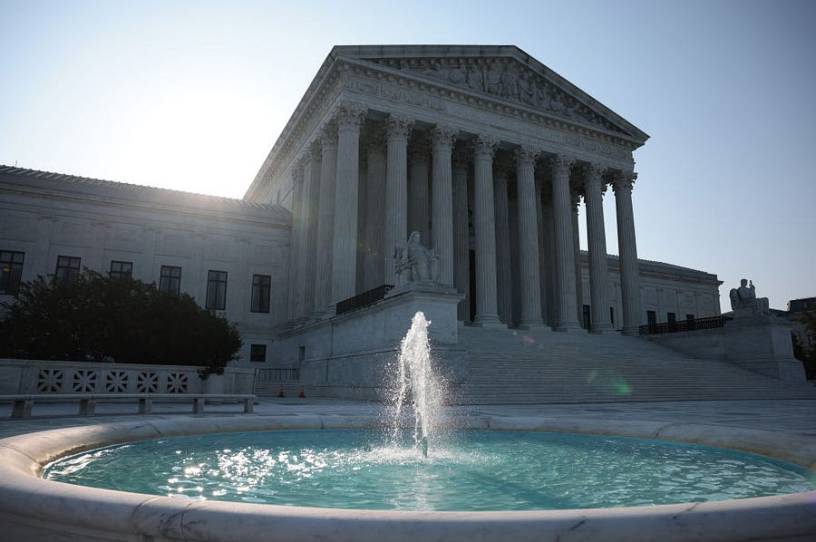Fact Check: Overturning Roe v. Wade Will Not Ban Abortion

Last week, Politico published a draft of a majority opinion for the Supreme Court’s decision in Dobbs v. Jackson Women’s Health Organization. The draft opinion is written by Justice Samuel Alito, and would overturn both Roe v. Wade and Planned Parenthood v. Casey if it holds (draft opinions have no legal force or effect, and opinions are final only when issued by the Supreme Court).
In the aftermath of this leak, social media was filled with people claiming that the Supreme Court was poised to “ban abortion.” A Variety article headline proclaimed “Howard Stern: Supreme Court Justices Who Ban Abortion Should Raise Every Unwanted Child.” Australian political commentator and former diplomat Bruce Haigh referred to “The US Supreme Court decision banning abortion” in a tweet. Another viral tweet reads: “The Supreme Court won’t force you to wear a mask in a pandemic — but it’ll force you to bear a child.” A number of other posts with the same claim can be found across social media. A 2019 public opinion survey found that nearly 66 percent of respondents similarly believe that overturning Roe and Casey would outlaw abortion in the United States. Those views are not accurate. Overturning Roe returns the matter to the elected branches of government.
Assuming the votes remain unchanged and a majority of justices vote to overturn Roe and Casey, such a decision would not make abortion illegal in the United States. Roe banned any abortion restrictions in the first trimester of pregnancy but allowed for restrictions in the second trimester and for prohibitions (with exceptions) in the third trimester.
Planned Parenthood v. Casey later replaced the trimester framework with one based on viability. In Planned Parenthood v. Casey, the court noted that the point of viability had shifted to earlier in pregnancy than at the time of Roe, and could continue to shift as medical technology advanced. Currently, the point of fetal viability is thought to be around the 23rd week of pregnancy. With viability as the new line, the court held that states could enforce restrictions and prohibitions after viability, but restrictions on terminating pre-viable pregnancies could not pose an “undue burden” on the woman seeking the abortion.
A law is considered to have an undue burden if it, either through intent or merely in effect, creates substantial obstacles in the process of getting an abortion.
Overturning Roe and Casey would allow states (or potentially the federal government) to ban or restrict pre-viability abortions as long as the law was rationally related to a legitimate government interest. Such decisions would fall to state lawmakers and to members of Congress.
If the Supreme Court holds that the Constitution doesn’t speak to abortion one way or the other, Congress could choose to pass a law either protecting or banning access to abortions—though there may be separate legal obstacles to whether Congress has the authority to regulate abortions at the federal level. Senate Majority Leader Chuck Schumer said he plans to bring to vote a bill that would ensure access to abortion in all 50 states for all nine months of pregnancy. A similar bill was filibustered by Senate Republicans and Democratic Senator Joe Manchin in February. The likelihood of this bill, or any others on the subject, passing the House and the Senate in our currently very closely divided Congress is slim.
At the state level, 13 states have “trigger laws” in place that would outlaw elective abortions once Roe is overturned, nine have pre-Roe abortion bans on the books that could be enforced—though lawmakers in Wisconsin and Michigan have already said they will not be—and 17 states have passed restrictions or bans post-Roe that could be enforced. Some states have both a trigger law and a pre- or post-Roe law on the books, bringing the total number of states that would have some sort of law banning abortions to 18—though that includes Wisconsin and Michigan—and five states that have abortion restrictions that would come into effect.
Sixteen states and the District of Columbia have laws on the books protecting access to abortion. Four of these states and Washington, D.C., guarantee abortion access throughout pregnancy. The remaining 12 have a viability cutoff. Democratic leaders in California, where abortion is protected by law, are seeking to add an amendment to the state constitution guaranteeing access to abortion as a right. Vermont has a constitutional amendment creating a right to abortion that has passed through its state legislatures and will appear on the ballot for voters to decide in November.
The Supreme Court will not ban abortion in the United States, even if the majority decision in Dobbs ultimately reflects the views in the leaked draft opinion. It returns the authority to determine the legality of abortion to elected officials.
If you have a claim you would like to see us fact check, please send us an email at factcheck@thedispatch.com. If you would like to suggest a correction to this piece or any other Dispatch article, please email corrections@thedispatch.com.